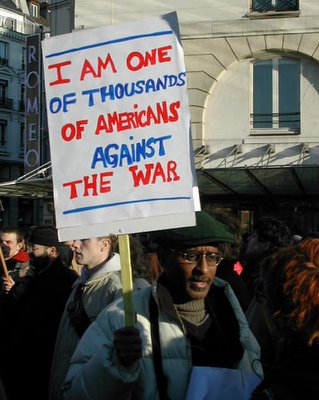
An American in Paris: Gerald Lenoir carries a message on February 15, 2003.
Hard as it may be to remember now, on this day only three years ago, 10 to 15 million people worldwide marched to try to prevent the U.S. invasion of Iraq. Out of the meetings of the World Social Forum in Porto Alegre, Brazil, in December 2002, came a call for a worldwide protest against U.S. plans. Email networks helped facilitate what became demonstrations in 800 cities worldwide. Just a few of the locations and numbers (where two figures appear, the first is what the police said, the second what the organizers claimed):
- Rome: 3 million people. According to the Guinness Book of World Records this was the "largest anti-war rally in history."
- London: 750,000 people (police) to 2 million (organizers)
- Paris: 100,000 or 200,000
- Berlin: 300,000 or 500,000
- Barcelona: 1.3 million
- Madrid: 660,000
- Other European cities: Oslo, Copenhagen, Stockholm, Brussels, Amsterdam, Vienna, Oviedo, Bern, Zagreb, Prague, Budapest, Warsaw, Istanbul, Athens
- Canada: Montreal, Toronto, Vancouver, Ottawa
- South America: Buenos Aires, Havana, Santiago, Rio de Janeiro, Caracas
- Africa: Lagos, Nairobi, Kigali, Johannesburg, Cape Town
- Asia: Tokyo, Kuala Lumpur, Calcutta, Seoul
- the "Middle East": Tel Aviv, Ramallah, Damascus, and of course Baghdad
- United States: New York, 100,000 to 400,000 (United for Peace and Justice), Los Angeles, San Francisco
- Full list of 800 known February 15, 2003 protests and crowd estimatesfrom the Wikipedia.
Three years ago, at least 63 percent of the U.S. people felt threatened enough by Iraq to believe an attack was justified. Just about no one else in the world believed that. A BBC poll showed that the population of nearly all countries opposed a war without UN mandate, and most viewed George W. Bush and the United State as a danger to world peace. Currently a USA Today/CNN/Gallup Poll finds the U.S. public is getting it about the Iraq war.
I guess that's progress, 2300 dead U.S. troops, about 200 dead other "coalition" troops, and uncounted -- maybe 100,000 or more -- dead Iraqis later.A 55% majority say the war in Iraq was a mistake. Just 31%, a record low since the question has been asked, say the United States and its allies are winning there.
It is worth remembering that the worldwide anti-war movement is the largest popular movement in history. Able to field the February 15 demonstrations with only a few months lead time, it has grown since and dwarfs the international anti-Vietnam war movement that grew up over a decade.
Probably its most concrete accomplishment was preventing democratic governments from jumping on the U.S. band wagon (Canada) and making it impossible for those who went along initially to stay on board (Spain and gradually several Eastern European states). Additionally, like all genuinely popular movements, it has also showed a quasi-anarchic creativity, continually generating new forms in order push aside the dams those in power set up to block popular expression. Three years ago, we'd never heard of Code Pink, Christian Peacemaker Teams in Iraq, Cindy Sheehan's demand that George W. Bush tell her why her son had to die, After Downing Street, and thousands of other actions and organizations that work to end the war.
And of course, the work of the anti-war movement is not over. Demonstrations are planned in London, Rome and other European cities on March 18, the anniversary of the Iraq invasion.
For a list of local March 18 events, mostly in the United States, visit United for Peace and Justice.
1 comment:
what would it be like if there was a war and nobody came?
Post a Comment